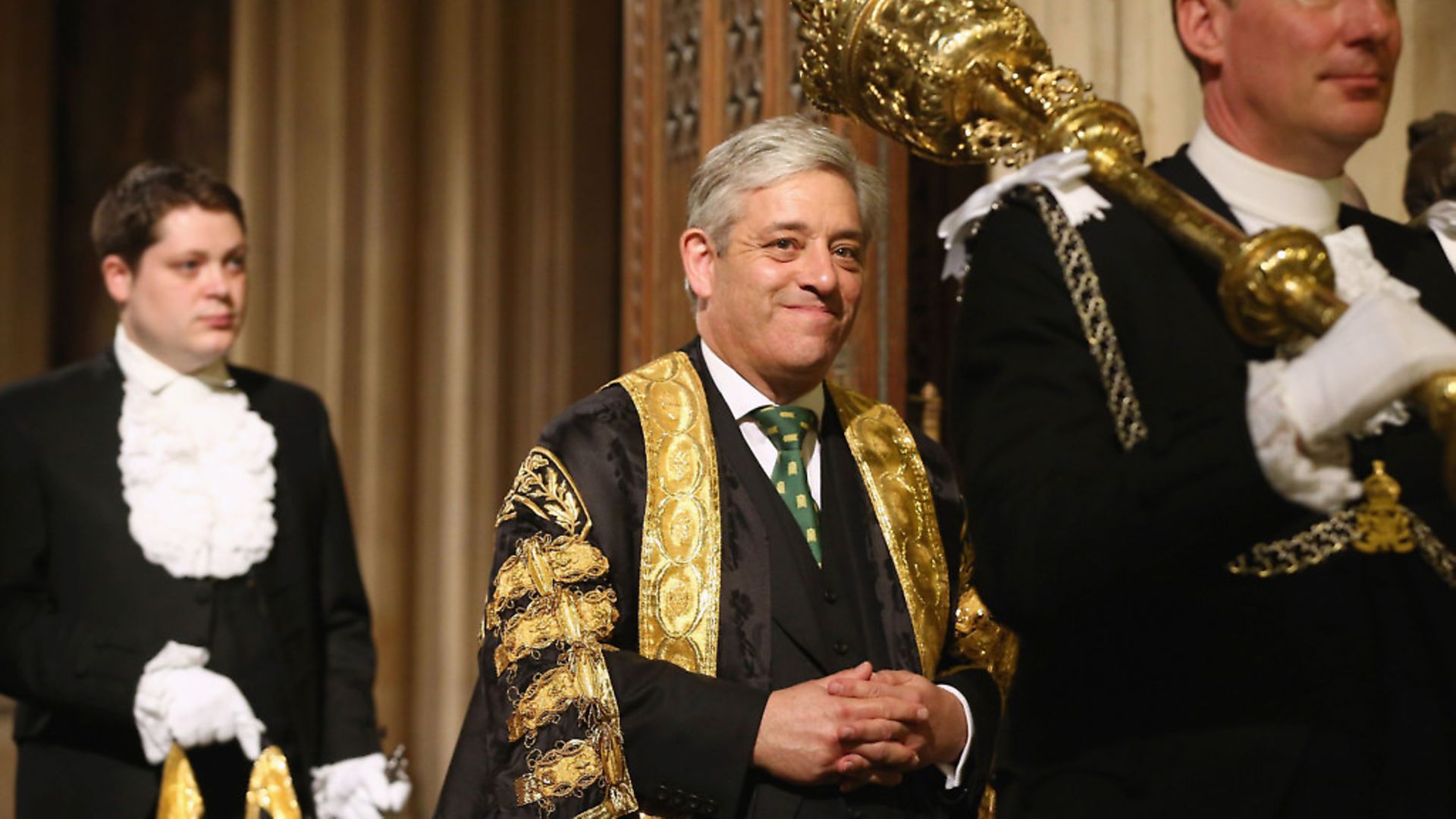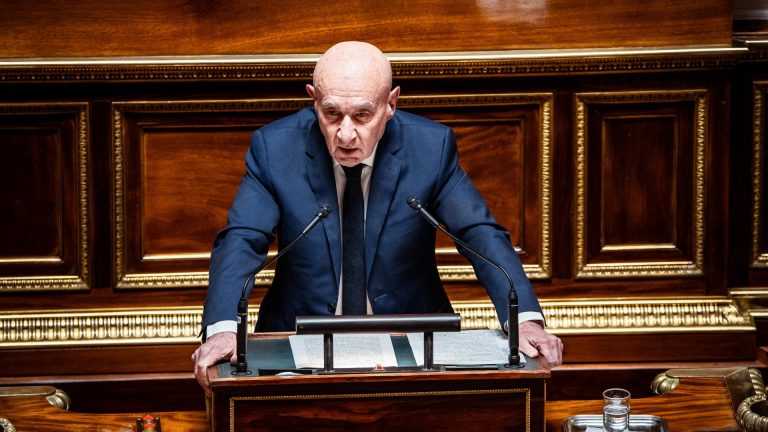
Much on display this week, John Bercow’s trademark belligerence – along with his circumlocutory rhetoric – are tactics he learnt young, says his biographer Bobby Friedman
Has John Bercow started enjoying himself? Seeing him grandstanding in front of the House of Commons – and the eyes of the world – this week, I began to detect that, at last, Bercow was in his element.
You might think that after almost 10 years in the speaker’s chair – already one more than he promised when he was elected back in 2009 – Bercow would be able to luxuriate in a role that’s traditionally been used as a retirement gift for an ageing and respected backbencher.
But then, for a man who now seems to have found a love for parliamentary precedent, Bercow is an unprecedented speaker. His tenure has been marked by constant battles with his enemies and one controversy after another. While he is keen to point out that a number of his predecessors were beheaded, many during the reign of Henry VIII (‘They ended up being shorter than me,’ Bercow likes to joke from his modest 5ft 6in), it is undeniable that Bercow is the most divisive speaker of modern times.
Having had the opportunity to study his life in depth (a rare treat, it has to be said), the course of his speakership is entirely unsurprising. He is the archetypal Marmite man. Loved by some, detested by others. But always leaving an impression wherever he goes.
Even as a child, the defining characteristics now seen in speaker Bercow were there.
His manner of speaking was always somewhat bizarre. He grew up in suburban north London, in middle-class comfort, but without any obvious model for the somewhat overblown eloquence that has become his trademark. His father was a small businessman turned minicab driver, and his mother a legal secretary. His sister speaks perfectly normally.
But, as a spotty kid with greasy hair, oratorical flourishes were already part of his repertoire. Bercow used to while away the hours by reading the Times on the wall outside his family home. The paper was so large that the boy sitting behind the news print, devouring the stories inside, could barely be seen. He’d peek out over the top if someone passed who he knew. ‘Have you seen what’s on page 5?’ he’d ask an unsuspecting adult. ‘It’s outrageous!’
At school, he was relentlessly teased. Bercow would use his superior intelligence to belittle his tormentors, writing down their mistakes and reading them back to them. He decided to wage war, rather than sue for peace, and it’s a tactic that he’s adopted ever since.
His early experiences might have taught him that sometimes it’s better to have your opponents in the tent rather than outside, but that lesson has evaded him. At his local comp, he ended up being thrown into the school biology pond and being told to stay there ‘with the other amphibians’. No wonder he’s always felt something of the outsider.
His outlet from this misery was tennis. Surprising as it may now seem, back in the 1970s, the 10-year-old Bercow was something of a prodigy. For his age group, he was the number one player in the country. He beat Ashley Fuller – who later became the head professional at the Roehampton Tennis Club – 6-0 6-0 when they first played. So ferocious was he that the father of one of the players on the junior circuit had some T-shirts printed, in a loving homage to little John (and Leeds United’s Norman Hunter), saying: ‘John Bercow bites yer legs’.
But the legs proved to be his downfall. As other children grew around him, Bercow remained steadfastly short. He joined a gym in Marylebone, but no number of weight-lifting sessions could make him any taller. His descent from maestro to middling was rapid. By the age of 14, he went from number one in the country to not even making the top 10 in Middlesex.
By the time he left school, politics had become his obsession – fuelled by hearing a speech from Margaret Thatcher during the Winter of Discontent. But things turned rather sinister. Bercow joined the Monday Club, an organisation on the Tory right, widely thought to be racist, where he soon became a member of its Immigration and Repatriation Committee, which favoured the voluntary repatriation of immigrants. He soon started touring round the country with Tory backbencher and ‘MP for Pretoria’ John Carlisle, who was known as a strong critic of Nelson Mandela. The decision was all the more bizarre because Bercow is Jewish, and descended from Romanian immigrants himself. He has since called his time in the Monday Club, ‘utter madness’. Quite.
At Essex University, where he studied politics with exceptional skill (the late professor Anthony King told me that Bercow frequently scored high firsts for his work), he was still unable to be, well, normal.
One friend told me that, ‘We’d quote Monty Python, he’d quote Disraeli’. He seemed to thrive on full-throttle debates against socialists in the Student Union, but secretly he used to go outside to throw up with nerves before making his speeches.
Soon afterwards he was elected as chairman of the Federation of Conservative Students – but even then he was unable to enjoy his moment of glory. After an almighty falling out between Conservative Central Office and many of his friends in the FCS, he sided with the party. The FCS was closed down – with Bercow acquiescing, but losing many a friend in the process.
A career in public affairs followed, but Bercow couldn’t wait to make his way in politics proper. He was appointed as a special adviser to Jonathan Aitken just before he was taken down by his own trusty sword of truth. Bercow found another job with Virginia Bottomley but, as only he could, he then ran against Bottomley’s husband Peter, to be selected as the Tory candidate for the West Worthing seat.
Bercow eventually found a berth in Buckingham, where he wooed the local association by turning up to his selection meeting in a helicopter (‘the best £1,000 I ever spent,’ he later said). He was elected as an MP in 1997 despite the Tory meltdown, and soon made himself a reputation as a parliamentary ‘jack in a box’, always on his feet in the Commons.
His time on the front bench soon came, but his inability to conform meant that it was always a difficult fit. He fell out with one party leader after another and matters hit rock bottom when he told Michael Howard that Ann Widdecombe was right to say that there was ‘something of the night’ about him. He was soon on the backbenches once more.
When David Cameron ran for the leadership, Bercow supported Ken Clarke, and went on the television to condemn Cameron for his ‘combination of Eton, hunting, shooting and lunch at White’s’. Cameron took it as a personal attack and used to ‘spit blood’ at Bercow’s name. Unsurprisingly Bercow’s career in the Tory party never recovered.
All the while, Bercow was undergoing a startling shift in his opinions. Where once he was, ‘more right-wing than Marie Antoinette’, as a fellow Monday Clubber told me, soon he began to gallop across the political spectrum. His initial moves towards the centre followed his mentor, Michael Portillo, but Bercow does nothing by halves. When he believes in a cause, he takes it up more strongly than anyone else.
He was on the right side of history in resigning from IDS’s shadow cabinet to vote in favour of gay adoption, but even his closest allies were surprised when he shifted his position on Europe. Where once he was an avowed anti-European, by 2008 he had turned against a referendum on the Lisbon Treaty. It is little surprise that he now has become as strong an opponent of Brexit as anyone else.
Many blamed – or credited – his wife Sally for the change. The oft-repeated charge is that he ‘discovered sex and New Labour at the same time’. While it’s true that he had struggled romantically – turning up at parties with his mother and announcing ‘I am a rampant heterosexual’ – the truth is rather more nuanced.
By the time Bercow stood for the speakership, he had few other political options. A combination of his Jekyll and Hyde personality – with a ferocious temper – and his ideological journey had alienated almost the entire Conservative Party. He was swept to the speaker’s chair on Labour votes – mainly because it was a Conservative’s turn, and Labour wanted to vote for the candidate that they knew that Cameron couldn’t stand.
The early years of Bercow’s speakership were dogged by constant criticism from the Conservative benches – and the underlying enmity came to the surface when William Hague led a failed putsch to remove Bercow just before the 2015 election.
Bercow’s withering put-downs – almost always directed at his political opponents – came across as unpleasant more than energising, while a public fallout with the then chief whip, Patrick McLoughlin seemed naive. His authority was worn down by his failed attempt to replace Richard Rogers as House of Commons clerk with the Australian, Carol Mills.
Time and again, when Bercow needed allies, instead he turned his enemies yet further against him. Even so, Bercow worked doggedly to turn things around, standing up for backbenchers and holding the government to account with urgent questions.
Luck has played an important part in helping him keep his job. During the coalition years, changing the speaker was never high on the agenda, however much Cameron wished that he could finally eject Bercow from the chair. Then came the EU referendum, and Theresa May’s botched election, which have helped to keep Bercow safe. His tactic now is to ensure that he has the support of precisely half the members in the House of Commons, caring little for whether he can win support from across the House. He can’t, but he’s rightly calculated that it doesn’t matter.
Now, Brexit presents him with an opportunity to win his place in the history books. Last year, he was facing calls to stand down amid numerous bullying allegations, but the vast political turmoil has helped to keep him in his post. Bercow has always had a point to prove and now, as speaker during the most tumultuous of parliamentary times, he’s taking his chance to put himself centre stage. For someone who loves the sound of his own voice, it’s hardly surprising that there was a glint in his eye when he made his surprise move this week. If Brexit is defeated, it may be in no small part to the – scrupulously neutral, of course – occupant of the speaker’s chair.
Bobby Friedman is a barrister, broadcaster and the author of Bercow, Mr Speaker: Rowdy Living in the Tory Party






